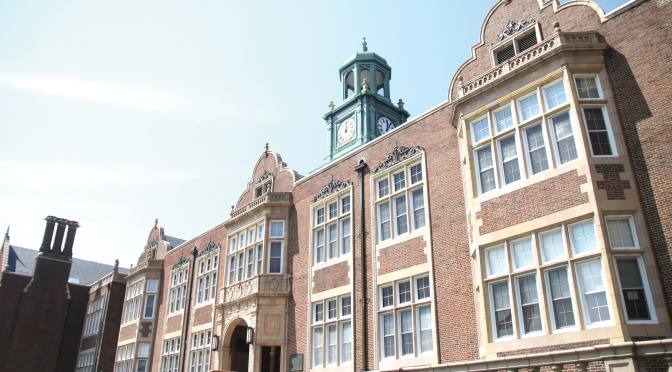
Case against education: professor speaks about why education is “flawed”
By: Jessica Ricks, Staff Writer
File photo by Cody Boteler/ The Towerlight
George Mason University professor Bryan Caplan advocated for vocational education to solve the problems he sees in the current education system when he visited Towson University on Feb. 13.
Caplan, who works in George Mason’s economics department, spoke to a room of about 50 TU students and faculty. He discussed points from his recently published third book, “The Case Against Education” that revolved around the flaws of our educational system.
Have you ever sat in a core class that has nothing to do with your major and wondered when you were ever going to use this information? Have you wondered why you have to pay so much money for higher education? Do you worry more about passing classes than actually learning the material?
If so, Caplan said you’re exhibiting symptoms of “signaling,” which he defined as showing off many skills and degrees that are not necessarily useful to an individual or society. He referenced this idea as the main problem with education these days.
“Though some schooling raises productivity, a lot is just hoop jumping to show off your IQ, work ethic and conformity,” Caplan said.
According to Caplan, the normal view on education is that education is a great thing and something we need more of. However, Caplan views the reality of education as being made up of classes that don’t teach job skills; “just a bunch of fluff that you won’t use in your day to day life.”
“You’re coming to school and you’re dipped in skills or skills are poured on you,” Caplan said.
To solve the current state of education, Caplan said we need a major educational reform, starting with drastically cutting education spending.
He also pushed for a change in how we approach education.
Instead of having students learn skills they may not use, Caplan said education should be vocational, starting at a middle or high school level where students can begin working for their careers and getting started earlier.
To Caplan, this method would be better for students and for taxpayers. In theory, students wouldn’t be required to attend college, they could choose a career sooner, and the market wouldn’t be flooded with college degrees that cause more competition for jobs.
Junior Kurt Waldron agreed with Caplan in a lot of ways. Already an enthusiast on the subject of educational reform, Waldron said we should eliminate public education entirely.
“No parent would send their kids to a failing school so failing schools would go out of business,” he said. “We need to experiment and try different things. I agree with vocational education.”
After Caplan’s talk, Melissa Groves, an associate economics professor at Towson, took a few minutes to share her response.
She agreed that vocational education would be a good solution, but disagreed with Caplan’s approach. She said it would cause disparities in people who could afford the education and would create an even larger gap in social class.
“To pull money out of public education means that the only people who will get an education are the people who can pay for it,” Groves said. “So that means if you’re lucky enough to be born into a family who can write a check for you to go to private school, you get an education. And if you’re born into a family that can’t afford it, you get nothing.”
Sophomore Ebise Abate also expressed mixed feelings towards Caplan’s viewpoint.
“He did make good points about how useful things you learn in school are,” Abate said. “But in my experience, if it’s taught correctly, it can be used in jobs.”

